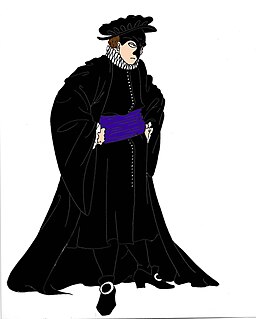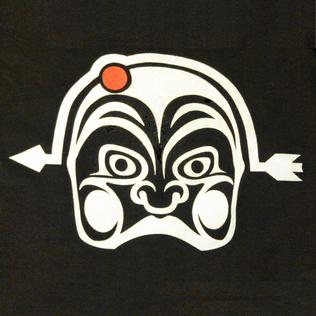Related Research Articles

Harlequin is the best-known of the zanni or comic servant characters from the Italian commedia dell'arte. The role is traditionally believed to have been introduced by Zan Ganassa in the late 16th century, was definitively popularized by the Italian actor Tristano Martinelli in Paris in 1584–1585, and became a stock character after Martinelli's death in 1630.

Zanni, Zani or Zane is a character type of Commedia dell'arte best known as an astute servant and a trickster. The Zanni comes from the countryside and is known to be a "dispossessed immigrant worker". Through time, the Zanni grew to be a popular figure who was first seen in commedia as early as the 14th century. The English word zany derives from this persona.
La Ruffiana is an older female character of the Commedia dell'Arte with a shady past or who used to be a prostitute. She is used most often in relationship to the vecchi of which group she is a nominal member. Ruffiana is most often romantically involved with Pantalone, though his love may easily be unrequited if it suits the plot. She is generally described as being talkative/gossipy, sneaky, and mischievous, but deep down is actually kind. She has been described as an "outsider" that always mixes things up and causes trouble for the rest of the characters. "Her quips reek of garlic"

Gli Innamorati were stock characters within the theatre style known as commedia dell'arte, which appeared in 16th century Italy. In the plays, everything revolves around the Lovers in some regard. These dramatic and posh characters were present within commedia plays for the sole purpose of being in love with one another, and moreover, with themselves. Despite facing many obstacles, the Lovers are always united by the end.

Il Dottore is a commedia dell'arte stock character, one of the vecchi, or "old men", whose function in a scenario is to be an obstacle to the young lovers. Il Dottore and Pantalone are the comic foil of each other, Pantalone being the decadent wealthy merchant, and Il Dottore being the decadent erudite. He has been part of the main canon of characters since the mid-16th century.
The Venetian Twins is a 1747 play by Carlo Goldoni, based on Plautus's Menaechmi.
Grammelot is an imitation of language used in satirical theatre, an ad hoc gibberish that uses prosody along with macaronic and onomatopoeic elements to convey emotional and other meaning, andused in association with mime and mimicry. The satirical use of such a format may date back to the 16th century commedia dell'arte; the group of cognate terms appears to belong to the 20th century.

The Servant of Two Masters is a comedy by the Italian playwright Carlo Goldoni written in 1746. Goldoni originally wrote the play at the request of actor Antonio Sacco, one of the great Truffaldinos in history. His earliest drafts had large sections that were reserved for improvisation, but he revised it in 1753 in the version that exists today. The play draws on the tradition of the earlier Italian commedia dell'arte.
Markus Kupferblum is an Austrian theatre and opera director, playwright and clown. He founded the first Austrian Fringe Opera Company, Totales Theater, in Vienna and is an expert on commedia dell'arte and mask theatre.
Carlo Mazzone-Clementi was a performer and founder of two schools of commedia, mime and physical theater as well as a contemporary and colleague of leaders of modern European theater. From his arrival in the USA in 1957, he was largely responsible for the spreading of commedia dell'arte in North America.
The Dell'Arte International School of Physical Theatre is located in Northern California in the town of Blue Lake, California in Humboldt County, California near the major population centers of Eureka and Arcata. Dell'Arte offers a NAST-accredited three-year MFA in Ensemble Based Physical Theatre, a one-year Professional Training Program, Summer Workshops, and a Study Abroad program in Bali. The school also has a professional company in residence, the Dell'Arte Company.

An actor is a person who portrays a character in a performance. The actor performs "in the flesh" in the traditional medium of the theatre or in modern media such as film, radio, and television. The analogous Greek term is ὑποκριτής (hupokritḗs), literally "one who answers". The actor's interpretation of their role—the art of acting—pertains to the role played, whether based on a real person or fictional character. This can also be considered an "actor's role," which was called this due to scrolls being used in the theaters. Interpretation occurs even when the actor is "playing themselves", as in some forms of experimental performance art.

Commedia dell'arte was an early form of professional theatre, originating from Italy, that was popular in Europe from the 16th to the 18th century. Commedia dell'arte was formerly called Italian comedy in English and is also known as commedia alla maschera, commedia improvviso, and commedia dell'arte all'improvviso. Commedia is a form of theatre characterized by masked "types" which began in Italy in the 16th century and was responsible for the advent of actresses and improvised performances based on sketches or scenarios. A commedia, such as The Tooth Puller, is both scripted and improvised. Characters' entrances and exits are scripted. A special characteristic of commedia dell'arte are the lazzi. A lazzo is a joke or "something foolish or witty", usually well known to the performers and to some extent a scripted routine. Another characteristic of commedia dell'arte is pantomime, which is mostly used by the character Arlecchino (Harlequin).
Vittoria Piisimi, was an Italian actress, singer, dancer, theatre director and musician. She was one of the most famous Italian actors of the period and known as the Divine Vittoria Piisimi. She and Isabella Andreini were the two most famed actresses of the era, and described as great rivals.
East West Theatre Company was established in 2005 in Sarajevo, Bosnia and Herzegovina. It is a nonprofit cultural institution which produces performing arts programs, publications, films, and music events. It also organizes touring shows, discussions, forums, master-classes and workshops. Important components of its work include a creation of new work and a commitment to international cooperation.
Flaminio Scala, commonly known by his stage name, Flavio, was a sixteenth-century Italian stage actor of Commedia dell'Arte, scenario writer, playwright, director, producer, manager, agent, and editor. Considered one of the most important figures in Renaissance theatre, Scala is remembered today as the author of the first published collection of commedia scenarios, Il Teatro delle Favole Rappresentative, short comic plays that served as inspiration to playwrights such as Lope de Vega, William Shakespeare, Ben Jonson, and Molière.
Mario Pirovano is an Italian theatrical actor, storyteller, translator and interpreter of Dario Fo's monologues.

i Sebastiani is a Commedia dell'Arte theatre troupe formed in 1990 by Jeff Hatalsky. To the present day, i Sebastiani has performed for thousands of fans across the United States and Canada. The company has travelled as far as Montreal to the north, Miami to the south, and Texas to the west, performing more than 100 different improvisational scenarios.

Antonio Fava is an actor, comedian, author, director, musician, mask maker and Internationally renowned Maestro of Commedia dell'arte who lives in Reggio Emilia, Italy.

Chiara D'Anna is an Italian actress, director, writer and academic notable for working with the writer and director Peter Strickland in Berberian Sound Studio and The Duke of Burgundy. While studying Geology at the University of Turin she joined drama school. Her directorial debut was an adaptation of Bulghakov's The Master and Margarita. The following year her adaptation of Oscar Wilde's Salome was awarded the Aquilegia Blu National Prize. After obtaining her MSc she left Italy to pursue her acting career in London.
References
- ↑ "Luoghi Dell'Arte Marco Luly E Luciana Codispoti". Luoghidellarte.com. Retrieved 2013-04-07.
- ↑ "Luoghi Dell'Arte Marco Luly E Luciana Codispoti". Luoghidellarte.com. Retrieved 2013-04-07.
- ↑ "Italian Cultural Institute in Singapore". Iicsingapore.esteri.it. 2006-11-03. Archived from the original on 2012-02-18. Retrieved 2013-04-07.
- ↑ "patravaditheatre.com". Archived from the original on 2011-07-15. Retrieved 2009-12-28.
- ↑ https://web.archive.org/web/20100601161202/http://www.fll.vt.edu/Riva10/Index10.html. Archived from the original on June 1, 2010. Retrieved December 28, 2009.Missing or empty
|title=(help)